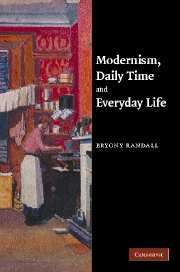Book contents
- Frontmatter
- Contents
- Acknowledgements
- List of abbreviations
- Introduction: dailiness
- Chapter 1 The contemporary context: Henri Bergson and William James
- Chapter 2 Dailiness in Dorothy Richardson's Pilgrimage
- Chapter 3 Re-creation, work and the everyday in Gertrude Stein
- Chapter 4 War-days: H.D., time and the First World War
- Chapter 5 Reading, writing and thinking: a Woolfian daily life
- Afterword
- Notes
- Bibliography
- Index
Chapter 3 - Re-creation, work and the everyday in Gertrude Stein
Published online by Cambridge University Press: 22 September 2009
- Frontmatter
- Contents
- Acknowledgements
- List of abbreviations
- Introduction: dailiness
- Chapter 1 The contemporary context: Henri Bergson and William James
- Chapter 2 Dailiness in Dorothy Richardson's Pilgrimage
- Chapter 3 Re-creation, work and the everyday in Gertrude Stein
- Chapter 4 War-days: H.D., time and the First World War
- Chapter 5 Reading, writing and thinking: a Woolfian daily life
- Afterword
- Notes
- Bibliography
- Index
Summary
INTRODUCTION: STEIN AND WORK
Gertrude Stein once wrote that ‘what is known as work is something that I cannot do’. For so prolific a writer, this may seem an unlikely statement. What it asks us to do, then, is examine more closely the meaning of ‘what is known as work’ for Stein. In this chapter I will suggest that internal to Stein's texts we find positive values attached to a kind of temporality or attention which does not involve the accepted attributes of ‘what is known as work’. The term ‘work’ bears certain standard associations, at the time of Stein's writing as now: involving some kind of labour or expenditure of energy, and based on an epistemology of logical cognition, it has a particular aim, usually explicit, and it involves a temporality of sequence and chronology, in particular one where time is valued quantitatively rather than qualitatively. Thus defined, ‘work’ also describes the conventions of reading, and writing, implied by a standard text. Stein's texts, however, challenge these assumptions. Her texts do not necessarily require laborious working-through; indeed, they resist it. They articulate and require the activation of alternative ‘ways of knowing’. They resist a teleological structure of origin and end, and they encourage exploration of alternative models of temporality, resisting the quantification of time.
Stein's textual techniques resonate with the improvised, fluid, sensual and evasive operations that we have come to associate with the everyday, particularly through the work of Lefebvre and de Certeau.
- Type
- Chapter
- Information
- Modernism, Daily Time and Everyday Life , pp. 92 - 123Publisher: Cambridge University PressPrint publication year: 2007

